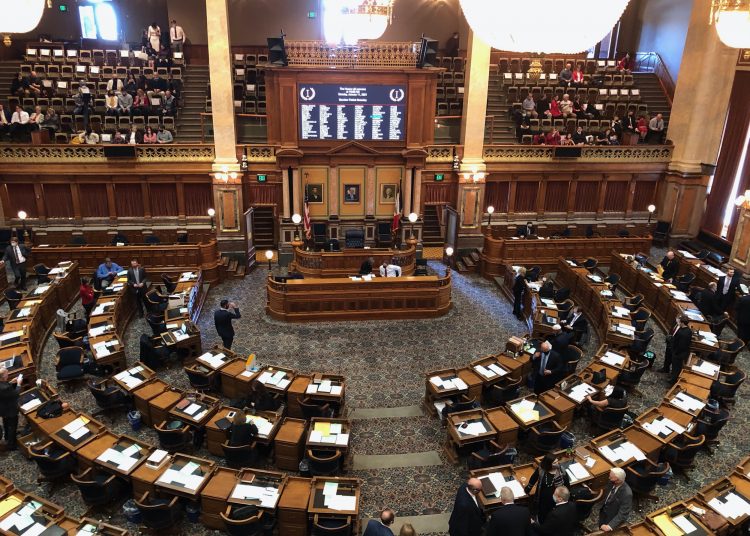DES MOINES, Iowa – The Iowa House passed HJR 11, a proposed constitutional amendment that would amend Article II, Section 5 of the Iowa Constitution to restore voting rights of those convicted of a felony once their sentence is discharged.
Iowa is one of only two states that does not have a legal process for restoring felon voting rights. Currently, the governor can individually restore voting rights to felons who apply. Gov. Kim Reynolds, last summer, by executive order, restored the voting rights of thousands of Iowans who completed their sentence.
There is no process in law, however, for that restoration to happen automatically.
Iowa’s constitution currently reads, “A person adjudged mentally incompetent to vote or a person convicted of any infamous crime shall not be entitled to the privilege of an elector.”
The constitutional amendment, if adopted, would change Iowa’s constitution to read, “A person adjudged mentally incompetent to vote or a person convicted of any felony who has not discharged his or her sentence shall not be entitled to the privilege of an elector.”
HJR 11 passed unanimously 95 to 0.
The amendment gives the Iowa Legislature the ability to define what a sentence discharge requires, which is what HF 818, companion legislation offered along with the amendment, does. The bill is part of a compromise with Iowa Senate Republicans who were unwilling to pass this constitutional amendment last session.
HF 818 prohibits those convicted of the offense of child endangerment that results in the death of a child or minor and those convicted of first-degree election misconduct from having their voting rights restored unless the governor pardons them.
The bill also requires completing any term of confinement, parole, and probation, the completion of any special sentence, and the completed payment of restitution owed to the victim of their crime before voting rights can be restored.
“I’ve stated many times before; not everybody deserves to have an automatic pathway to the restoration of their voting rights,” State Rep. Bobby Kaufmann, R-Wilton, the bill’s manager, said during his opening remarks for the bill.
State Rep. Mary Wolfe, D-Clinton, who stood during the brief debate on HJR 11 to say she enthusiastically supported the proposed constitutional amendment, could not support this bill.
“I do not think that one of the factors that can stand in the way of a person being able to vote is the ability to pay money,” she said.
Wolfe admitted that requiring restitution would likely be considered constitution. She is troubled that some would have the means to pay the restitution right away and others would not. She said she believes victims have the right to be paid restitution but doesn’t believe tying it to the right to vote will see it be paid faster.
“I would like to see this body focus on coming up with a way to basically pay at least some victim restitution to the victims out of the general fund. And then having this body or an arm of this body, collect that restitution from a defendant. So we take that burden off of the victim. I don’t think victims should have to go chasing after defendants in order to collect the restitution,” she said.
“I understand that this bill has to pass. I appreciate the whole package moving forward. I’ll be a no on this bill. But I look forward to voting yes again on the constitutional amendment in two years,” Wolfe concluded.
State Rep. Bruce Hunter, D-Des Moines, wasn’t as diplomatic, calling the restitution requirement a poll tax.
“We shouldn’t have a poll tax in Iowa. We shouldn’t have a paid to vote system. It is morally wrong. And I believe it’s unconstitutional to prevent felons from voting simply because they can’t afford to pay back court fees, fines, and restitution to victims,” he said.
The bill only requires restitution to victims to be paid, not court fees and fines.
House Joint Resolution 11 is a start to restoring the right to vote for felons. For that, I am grateful. But that right should not be predicated on the ability to pay a poll tax. The right to vote should not be determined by who is rich enough. The right to vote should be enjoyed by everyone, regardless of income,” Hunter stated.
In his closing remarks, Kaufmann countered that requiring restitution has been upheld by the U.S. 11th Circuit Court of Appeals. He also noted that Governor Reynolds currently requires a restoration payment plan before restoring felon voting rights.
” I haven’t seen any outrage on that. I haven’t seen any lawsuits challenging that. This is no poll tax. You don’t have a right to be made whole with your rights until the individual you have harmed is made whole financially. Representative Hunter, you said that everyone should be able to enjoy the right to vote. Well, how about the victim who was murdered? They don’t enjoy that right. They’re never going to go home and hug their family or see their kids grow up. That right was taken from them from an individual who may be forced by a judge to pay the family restitution. And they sure as heck do not deserve to have their rights back when that person will never enjoy that right that you’re so passionately advocating for,” he argued.
HF 818 passed 67 to 28, with several Democrats joining Republicans to pass the bill.
HJR 11 needs to pass in the Senate and then pass in the Iowa Legislature a second time during the 90th General Assembly before it will go before Iowa voters.
Listen to the debate over HF 818 below:
















